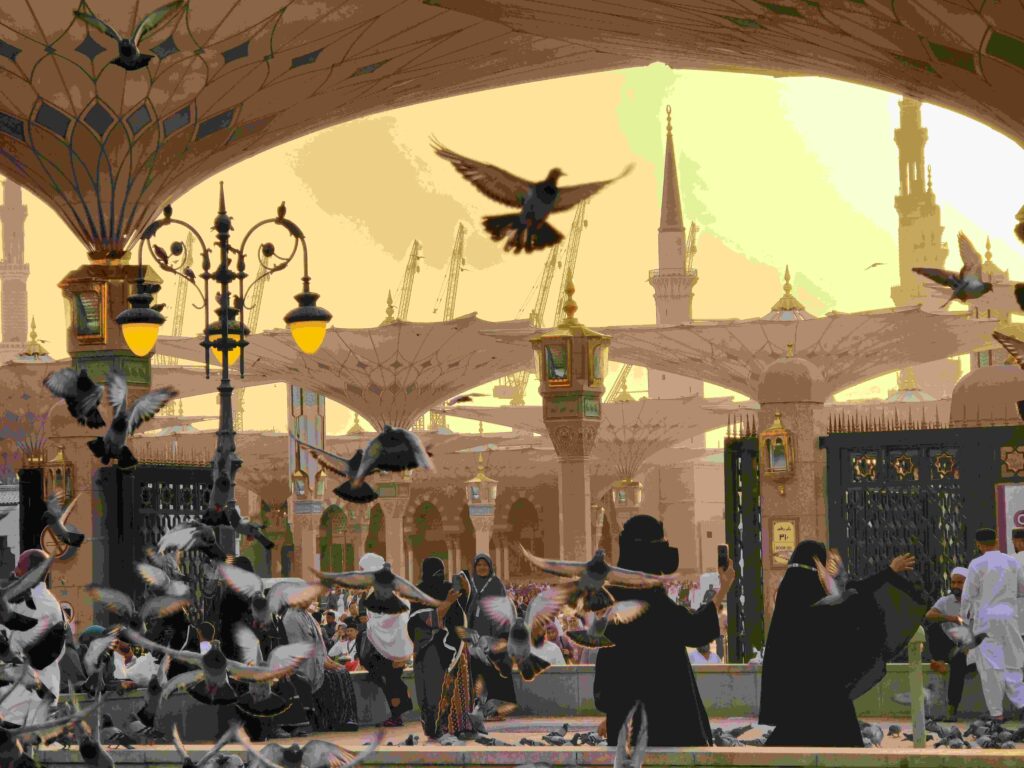Throughout history, there have been countless leaders, thinkers, and philosophers who have shaped the course of humanity. However, when it comes to influence, one figure stands unparalleled: Hazrat Muhammad (SAW). As the last Prophet of Islam, he not only changed the lives of millions but also laid the foundation for a civilization that thrives even today. His teachings, actions, and guidance continue to resonate with people across the globe.
Early Life of Hazrat Muhammad (SAW)
Born in 570 CE in Mecca, Hazrat Muhammad (SAW) grew up in a period of ignorance and immorality known as the Age of Jahiliyyah. Despite being born into such an era, his character was extraordinary. From an early age, he was known for his honesty and integrity, earning the titles “Al-Amin” (the trustworthy) and “Al-Sadiq” (the truthful).
Revelation and the Beginning of Prophethood
At the age of 40, Hazrat Muhammad (SAW) received his first revelation from Allah through the Archangel Jibreel (Gabriel). This event, which took place in the cave of Hira, marked the beginning of his prophethood. The revelations, later compiled into the Holy Quran, form the core of Islamic teachings. These divine messages were not only spiritual in nature but also addressed societal issues, human rights, justice, and morality.
The Teachings of Hazrat Muhammad (SAW)
Islam, which means submission to the will of Allah, was not just a new religion but a complete way of life. Hazrat Muhammad (SAW) brought forth teachings that emphasized:
- Monotheism (Tawheed): The belief in one God, Allah, as the central tenet of Islam.
- Equality: In a world where social hierarchy and tribalism were rampant, he preached equality of all humans, irrespective of race, gender, or status.
- Justice: The Prophet (SAW) was a staunch advocate of justice and fairness, both in legal matters and daily interactions.
- Charity (Zakat): He emphasized the importance of helping the less fortunate, making charity one of the pillars of Islam.
- Respect for women: Hazrat Muhammad (SAW) advocated for the rights of women, encouraging their education and financial independence.
Hazrat Muhammad’s (SAW) Impact on Civilization
The influence of Hazrat Muhammad (SAW) extended beyond religious boundaries. He transformed the Arabian Peninsula from a region plagued with conflict into a unified society based on peace and justice. His leadership and guidance led to the formation of a flourishing Islamic civilization that significantly contributed to the fields of science, medicine, mathematics, and literature.
Even non-Muslim historians and scholars acknowledge the profound impact of Hazrat Muhammad (SAW). In his famous book “The 100: A Ranking of the Most Influential Persons in History,” Michael H. Hart ranked the Prophet Muhammad (SAW) as the most influential person in the world. Hart recognized that his influence extends beyond religion and is deeply rooted in societal, political, and ethical changes that have shaped the world.
The Constitution of Medina
One of Hazrat Muhammad’s (SAW) greatest achievements was the establishment of the Constitution of Medina—a groundbreaking document that outlined the rights and duties of the inhabitants of Medina, including Muslims, Jews, and Christians. This constitution is considered one of the earliest examples of constitutional governance and human rights in history.
The Character of Hazrat Muhammad (SAW)
The personality and character of Hazrat Muhammad (SAW) have left an indelible mark on history. He was a man of humility, patience, and forgiveness, often choosing peace over conflict, even in the face of severe opposition. His leadership style, based on consultation (Shura) and empathy, set an example for future leaders.
In the Battle of Uhud, when the Muslims faced defeat, Hazrat Muhammad (SAW) exemplified forgiveness and mercy by pardoning those who had fought against him. His kindness to the poor, orphans, and even animals further emphasized his compassionate nature.
Legacy and Continued Influence
More than 1400 years after his death, Hazrat Muhammad’s (SAW) legacy continues to thrive. His life is a model for Muslims around the world, guiding them in every aspect of life, from personal relationships to governance. The Islamic calendar begins with the Hijra, marking the migration of the Prophet (SAW) from Mecca to Medina—a journey that symbolizes the establishment of the Islamic state.
The influence of Hazrat Muhammad (SAW) can be seen not only in the 1.8 billion Muslims who follow his teachings but also in the legal, social, and cultural norms that have been inspired by his life.
Conclusion
Hazrat Muhammad (SAW) was not just a religious figure; he was a revolutionary who transformed society through his teachings and actions. His influence on humanity is undeniable, and his message of peace, justice, and compassion continues to resonate with people across the world. Indeed, Hazrat Muhammad (SAW) remains the most influential person in the history of mankind.
For Any Kind Of Queries Please Contact Us
Frequently Asked Questions:
- Why is Hazrat Muhammad (SAW) considered the most influential person in history?
Answer: Hazrat Muhammad (SAW) not only established a new religion but also revolutionized societal, political, and ethical systems, making a lasting impact on humanity.
- What were the main teachings of Hazrat Muhammad (SAW)?
Answer: His main teachings include belief in one God (Tawheed), equality, justice, charity, and respect for women.
- How did Hazrat Muhammad (SAW) impact the world beyond religion?
Answer: He laid the foundation for a unified civilization and significantly contributed to fields like governance, human rights, science, and literature.
- What is the Constitution of Medina?
Answer: It was a document created by Hazrat Muhammad (SAW) that established the rights and responsibilities of different religious communities living in Medina, promoting coexistence.
- Why do non-Muslim historians consider Hazrat Muhammad (SAW) influential?
Answer: Historians acknowledge his transformative impact on society, governance, and culture, recognizing his role in shaping a new world order.

